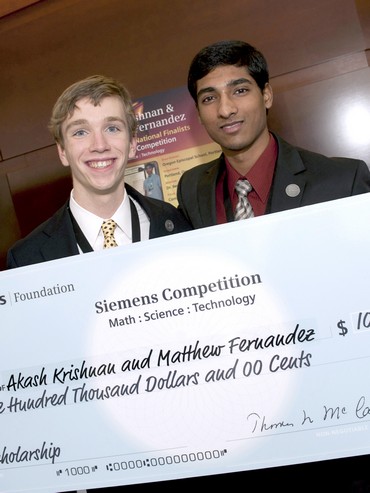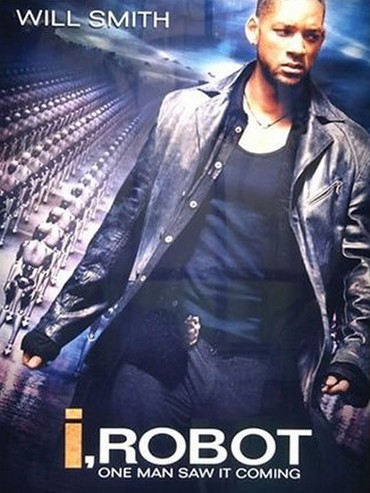Suman Guha Mozumder
Inspired by the Will Smith-starrer, Akash Krishnan bags top science prize. Suman Guha Mozumder reports
An Indian American high school student from Oregon, who made a science project inspired by the movie I, Robot, is the joint winner of the first prize in the team category at the 2010 Siemens Competition in Math, Science and Technology, one of the highest honors for high school students.
The results of the 12th annual Siemens Competition were announced at the George Washington University last week. Akash Krishnan and Matthew Fernandez, juniors at Oregon Episcopal School, Portland, won for developing 'Recognition of Emotion in Human Speech' -- a computer algorithm to detect emotion more accurately.
Akash is a veteran of science competitions. He placed first in his district's First Lego League competition for four years running, was a semifinalist in the 2010 Oregon Computer Science Competition and was awarded Best of Fair with Fernandez in the Intel ISEF Competition. The duo will share the $100,000 college scholarship.
'The team built a computer algorithm that allows us to listen to an auditory signal from a human, analyze it and assess the emotional state of the speaker,' said competition judge Gert Lanckriet, department of electrical and computer engineering, University of California, San Diego.
'It can help identify, for example, if the speaker is angry, sad, bored, anxious or happy. They came up with a strong creative idea and brought it from theory into practice. The team was inspired by the movie I, Robot, in which a robot can sense when its user is under stress. Using an emotional speech database with 18,215 files and five emotions (anger, positive, neutral, emphatic, rest), the team developed, trained and tested a classification engine to determine emotions from an input signal.'
The duo achieved a 60 percent accuracy rate in identifying emotions versus 41 percent with a previous award-winning system. Their work has a broad range of applications, from autism research to computer games and lie detection.
Lanckriet said Akash and Matthew 's work could even be used to enhance cell phone technology. 'With cell phones today most encoding is designed to ensure words are understood, but the emotional background of the conversation may be lost. Their work could help ensure the emotion comes through,' he added.
The Siemens Foundation launched the Siemens Competition in 1998 to recognise America's brightest math and science students. Six individuals and six teams competed at the national finals early this month after winning one of six regional competitions in November. They presented their research to a panel of judges composed of scientists and mathematicians.
Three other students of Indian origin -- Santosh Narayan of Munster, Indiana; Nikhil Mehandru of Roslyn, New York; and Sonia Prasad of Roslyn Heights, New York, placed fourth in the team category and won a $30,000 scholarship.
Benjamin Clark, a 15-year-old senior at Penn Manor High School in Millersville, Pennsylvania, won the $100,000 grand prize in the individual category for research that sheds new light on how stars are born.
The winners of $100,000 prizes will ring the Closing Bell at the New York Stock Exchange in January.
'These students inspire us all with their passion and commitment to serious scientific research,' said Thomas McCausland, chairman, Siemens Foundation. 'As America focuses on reinvigorating math and science education, they remind us of what is possible when young people are challenged to do science at the highest level.'
'I would love to have a company of my own'
Image: Will Smith, who Akash counts as one of his favourite actors in the movie that inspired himFor his 10th grade science project Akash Krishnan, 16, of the Oregon Episcopal School tried to think of some novel idea in September 2009. But in the midst of school and homework, he could not come up with one. He decided to take a break from studies to watch the movie I, Robot once again.
The movie, which is based on humanoid robots helping humans in futuristic settings, has a scene where a robot is able to detect elevated stress levels in its users and act accordingly against threats.
"After watching the movie for the second time, there was a thought in my mind and my teammate Matthew Fernandez, with whom I have been working since seventh grade, and I felt this could be a potential science project," Akash who is now in 11th grade, told India Abroad. "That is what inspired us to pursue our winning project at the Siemens Competition. We wanted to figure out if the ability for robots to recognise emotions was possible; we found it was."
"To get the project to where it is now, we did hours of background research," he said.
"We used Web resources through Google... journals, encyclopedias and books. Our project is related to psychology, physics, natural language processing, digital signal processing, and computer science, so we had to learn enough about all of those subjects. We began our research at the beginning of October of 2009, and we had our first breakthrough complete program done by the end of Winter break We did not contact anyone from outside our school or family until after we finished our first complete version."
The victory, he said, felt amazing. "I was dreaming about receiving the 100K scholarship; this was pretty much what was on my mind during the initial submission of the research paper back in mid-September," he added. "After being selected as a regional finalist I watched videos on the previous national competitors and told myself that my predecessors were too good and too professional; that I could never present like that.
But I wanted the 100k scholarship... After this entire process, I'm glad to have experienced this competition and I'm happy to know that you can achieve anything if you put your mind to it. At first, the presentation was hard, but looking back now, it feels so simple and easy."
Texas-born Akash said his parents Krishnan Palaniswami and Anitha Krishnan, both from Tamil Nadu, inspired his interest in science and computers. His dad is an electrical engineer at Microsoft; his mom is a software engineer at Synopsys, Inc.
"My mom took care of my brother and me when we were young, and she worked from home, so I started to figure out what she did on her computer," he said. "I soon figured out the basics of what she was doing, and using my skills at searching Google, I quickly learned computer programming, and slowly gained knowledge in many languages and forms of computer science. This is what led me to do this computer science-related emotion recognition project."
Akash has his own server at home, a Web server and a Web site that he uses to share information. He hosts a couple of programs that his school uses for middle schoolers.
He wants to study a combination of computer science and electrical engineering and has one dream -- to make technology more accessible and easy-to-use. "Technology should be as intuitive to use as possible, and anyone should be able to use the basics of any program," he said. "I would also love to have a company of my own that is related to computer engineering."
Alongside studies, Akash has been doing Okinawan karate for five years and has been playing the piano since he was in 2nd grade. Besides chess, which he has been playing since he was a child, his other passion, not surprisingly, is watching movies, both Indian and American.
"I can't really name a favorite, because I've probably watched over 300 action/adventure, mystery, sci-fi, and thriller movies, but some actors' that I like are Denzel Washington, Will Smith, Johnny Depp, Tom Cruise, Bruce Willis, Mel Gibson."



Comment
article